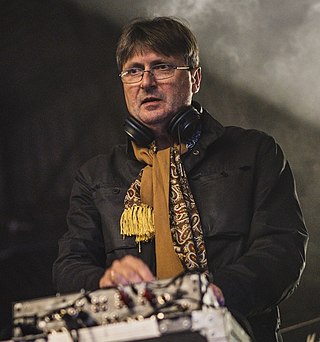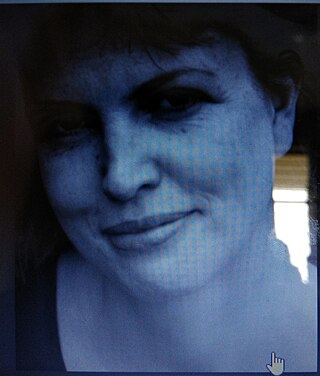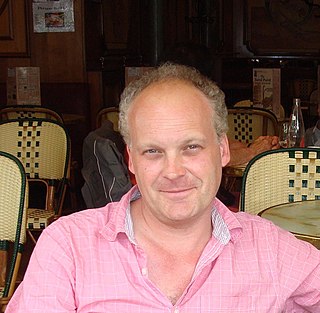Related Research Articles

Dame Carol Ann Duffy is a Scottish poet and playwright. She is a professor of contemporary poetry at Manchester Metropolitan University, and was appointed Poet Laureate in May 2009, and her term expired in 2019. She was the first female poet laureate, the first Scottish-born poet and the first openly lesbian poet to hold the Poet Laureate position.

Simon Robert Armitage is an English poet, playwright, musician and novelist. He was appointed Poet Laureate on 10 May 2019. He is professor of poetry at the University of Leeds.

Tim Liardet is a poet twice nominated for the T. S. Eliot Prize, a critic, and Professor of Poetry at Bath Spa University.

Pascale Petit, is a French-born British poet of French, Welsh and Indian heritage. She was born in Paris and grew up in France and Wales. She trained as a sculptor at the Royal College of Art and was a visual artist for the first part of her life. She has travelled widely, particularly in the Peruvian and Venezuelan Amazon and India.
Robin Robertson is a Scottish poet.
Michael George Laskey is an English poet and editor.
Catherine Fisher is a poet and novelist for children and Young Adults. Best known for her internationally bestselling novel Incarceron and its sequel, Sapphique, she has published over 40 novels and 5 volumes of poetry. She has worked as an archaeologist, and as a school and university teacher, is an experienced broadcaster and adjudicator and has taught at the Arvon Foundation and Ty Newydd Writers' Centres. She lives in Wales, UK.

Sean O'Brien FRSL is a British poet, critic and playwright. Prizes he has won include the Eric Gregory Award (1979), the Somerset Maugham Award (1984), the Cholmondeley Award (1988), the Forward Poetry Prize and the T. S. Eliot Prize (2007). He is one of only four poets to have won both the T. S. Eliot Prize and the Forward Poetry Prize for the same collection of poems.

Tishani Doshi FRSL is an Indian poet, journalist and dancer based in Chennai. In 2006 she won the Forward Prize for Best First Collection due to Countries of the Body. Her poetry book A God at the Door was later shortlisted for the 2021 Forward Prize for Best Collection. She was elected a Fellow of the Royal Society of Literature in 2023.
Tony Curtis is a Welsh poet who writes in English.
John Stammers is a British poet and writer.

Kathryn Simmonds is a British poet and short story writer.
Hillary Menos is an English poet. She is a two-time winner of The Poetry Business International Book & Pamphlet Competition, for her pamphlets Extra Maths and Human Tissue, and won the Forward Prize for Best First Collection for Berg (Seren) in 2010.

Patrick McGuinness FRSL FLSW is a British academic, critic, novelist, and poet. He is Professor of French and Comparative Literature at the University of Oxford, where he is Fellow and Tutor at St Anne's College.

Helen Mort is a British poet and novelist. She is a five-time winner of the Foyle Young Poets award, received an Eric Gregory Award from The Society of Authors in 2007, and won the Manchester Poetry Prize Young Writer Prize in 2008. In 2010, she became the youngest ever poet-in-residence at the Wordsworth Trust, Grasmere. In the same year she was shortlisted for the Picador Prize and won the Norwich Café Writers' Poetry Competition with a poem called "Deer". She was the Derbyshire Poet Laureate from 2013 to 2015. In 2014, she won the Fenton Aldeburgh First Collection Prize for "Division Street".
John Lancaster is a British poet and writer. He has published six collections of poetry: Effects of War (1986); Split Shift (1990); The Barman (1993), Here In Scotland (2000) and Potters: A Division of Labour (2017) which won the inaugural Arnold Bennett Book Prize. His latest collection is Where The Trent Rises (2023) from Clayhanger Press.
Ian Johnson, known by his Dharma name Maitreyabandhu, is a British Buddhist writer and poet who lives and works at the London Buddhist Centre. He has written a number of books on Buddhism. His poetry has been published by Bloodaxe and awarded the Keats-Shelley Prize and the Geoffrey Dearmer Award.
Maggie Harris is a Guyanese poet, prose writer, and visual artist. She was awarded the Guyana Prize for Literature in 2000 and 2014 for her collections of poetry Limbolands and Sixty Years of Loving, respectively. She also received the Commonwealth Short Story Prize for the Caribbean region in 2014 for Sending for Chantal.
The Poetry Business are an independent press, and a writer development agency, based in Sheffield. Since 1986, they have run workshops, mentorships, competitions and more. The poet duo Peter and Ann Sansom, are the directors of the Poetry Business.
Kim Moore is an English poet from Leicester who now lives and works in Cumbria. She won an Eric Gregory Award in 2011, and her debut collection The Art of Falling won the Geoffrey Faber Memorial Prize in 2017. Her second collection All the Men I Never Married was awarded the Forward Prize for Best Collection in 2022.
References
- ↑ "Ben Wilkinson". The Guardian. Retrieved 2019-03-24.
- ↑ "Ben Wilkinson – Poetry Spotlight" . Retrieved 2019-05-17.
- ↑ "Ben Wilkinson | Seren Books". serenbooks.com. Retrieved 2019-07-12.
- ↑ "Northern Writers Awards winners 2014". Northern Writers Awards. Retrieved 2019-03-24.
- ↑ "University of Bolton lecturer and poet Dr Ben Wilkinson takes Shakespeare to Seoul | University of Bolton". bolton.ac.uk. Retrieved 2019-05-17.
- ↑ Wilkinson, Ben (2019-08-05). "Ahead of the pack: the best books about running". The Guardian. ISSN 0261-3077 . Retrieved 2019-08-21.
- ↑ "The Poetry Business - The Result is What You See Today". poetrybusiness.co.uk. Retrieved 2019-09-17.
- ↑ "Realities and Dreams | Poetry London | Clare Pollard reviews For Real and other pamphlets". 5 February 2015. Retrieved 2019-03-26.
- ↑ "Way More Than Luck | Seren Books". serenbooks.com. Retrieved 2019-03-24.
- ↑ "Same Difference | Seren Books". www.serenbooks.com. Retrieved 2022-01-05.
- ↑ "The Poetry Business – The Result Is What You See Today: Poems About Running". poetrybusiness.co.uk. Retrieved 2019-09-17.
- ↑ "Liverpool University Press: Don Paterson". liverpooluniversitypress.co.uk. Archived from the original on 2021-03-11. Retrieved 2021-06-11.
- ↑ Axel (2018-09-07). "Creative Writing lecturer recognised in prestigious Forward Prizes". University of Bolton. Retrieved 2019-08-21.
- ↑ "The Poetry Business - Ben Wilkinson". poetrybusiness.co.uk. Retrieved 2019-03-24.
- ↑ Carpenter, Caroline. "Northern Writers' Award winners share £40k pot | The Bookseller". thebookseller.com. Retrieved 2019-03-24.
- ↑ Page, Benedicte (2010-11-25). "Picador poetry prize: 10 new voices shortlisted". The Guardian. ISSN 0261-3077 . Retrieved 2019-03-26.
- ↑ "Vol 108, No 3, Autumn 2018 – The Poetry Society". poetrysociety.org.uk. Retrieved 2019-03-27.
- ↑ "Pamphleteers". TheTLS. Retrieved 2019-03-27.
- ↑ "Noel Williams reviews Ben Wilkinson's For Real". antiphon.org.uk. Retrieved 2019-03-27.